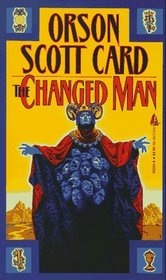Helpful Score: 4
I'd read about half of the stories in this collection of eleven before, in different books. This collection is on the theme of Card's more horror-oriented stories.
In his introduction, he talks about the delineations between dread, terror, and horror, and goes on rather sententiously about how horror is just about the blood and gore and nastiness, and how HIS (superior) stories are all about the "dread."
Then, the first story in the collection ("Eumenides in the Fourth Floor Lavatory") features an inhuman monster baby with suckers that create running sores, slime, blood, pus, said "baby" being hacked apart with a knife, shoved down a toilet, etc... In other words, as much gore and goo as in any story I've ever come across....
So... HMMM.
Of course, the story isn't all about the gross-out factor, it's about guilt and nasty people getting the punishment that coming to them, even when other people forgive them their sins. But you know what? Very little horror isn't actually "about" something, if one actually reads it.
Anyway, Card is a good writer, and many of these stories are very good. However, some do get annoyingly moralizing, especially "Closing the Timelid," which, as Card himself states in his Afterword, is "a homily against hedonism." As a pro-hedonist, obviously, I disagree!
In his introduction, he talks about the delineations between dread, terror, and horror, and goes on rather sententiously about how horror is just about the blood and gore and nastiness, and how HIS (superior) stories are all about the "dread."
Then, the first story in the collection ("Eumenides in the Fourth Floor Lavatory") features an inhuman monster baby with suckers that create running sores, slime, blood, pus, said "baby" being hacked apart with a knife, shoved down a toilet, etc... In other words, as much gore and goo as in any story I've ever come across....
So... HMMM.
Of course, the story isn't all about the gross-out factor, it's about guilt and nasty people getting the punishment that coming to them, even when other people forgive them their sins. But you know what? Very little horror isn't actually "about" something, if one actually reads it.
Anyway, Card is a good writer, and many of these stories are very good. However, some do get annoyingly moralizing, especially "Closing the Timelid," which, as Card himself states in his Afterword, is "a homily against hedonism." As a pro-hedonist, obviously, I disagree!




